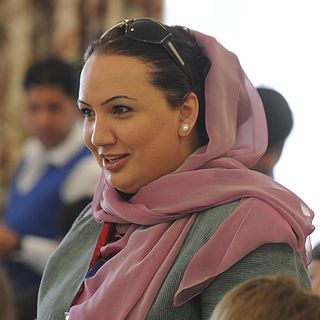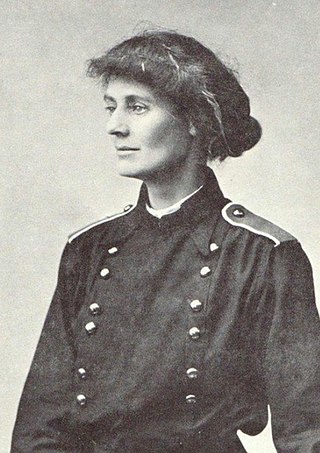Women were able to be members in the Parliament of Afghanistan from the United States invasion of Afghanistan until the Fall of Kabul in 2021. Since then those who were elected have gone into hiding, many fleeing the country entirely. [1] Many of them were recognised as part of the BBC's 100 Women in 2021. [2]
There were 69 elected in the 2018 parliamentary election, but most of them currently reside in Greece as refugees. [3] They live in Athens in exile. [4] [5]

The treatment of women by the Taliban refers to actions and policies by various Taliban regimes which are either specific or highly commented upon, mostly due to discrimination, since they first took control in 1996. During their first rule of Afghanistan (1996–2001), the Taliban were notorious internationally for their misogyny and violence against women. Since 1996, women were mandated to wear the burqa at all times in public. In a systematic segregation sometimes referred to as gender apartheid, women were not allowed to work, nor were they allowed to be educated after the age of eight. Women seeking an education were forced to attend underground schools, where they and their teachers risked execution if caught. They were not allowed to be treated by male doctors unless accompanied by a male chaperone, which led to illnesses remaining untreated. They faced public flogging and execution for violations of the Taliban's laws. The Taliban allowed, and in some cases encouraged, marriage for girls under the age of 16. Amnesty International reported that 80 per cent of Afghan marriages were forced.

Dame Margaret Olivia Hillier, known as Meg Hillier, is a British Labour and Co-operative politician who was elected as the Member of Parliament (MP) for Hackney South and Shoreditch at the 2005 general election, was a junior government minister (2007–10) and was succeeded by Caroline Flint as Shadow Secretary of State for Energy and Climate Change in the Labour Party October 2011 reshuffle. She has chaired the Public Accounts Committee since 2015.

The Verkhovna Rada of Ukraine, often simply Verkhovna Rada or just Rada, is the unicameral parliament of Ukraine. The Verkhovna Rada is composed of 450 deputies, who are presided over by a chairman (speaker). The Verkhovna Rada meets in the Verkhovna Rada building in Ukraine's capital Kyiv. The deputies elected on 21 July 2019 Ukrainian parliamentary election were inaugurated on 29 August 2019.

Afghanistan sent a delegation to compete at the 2004 Summer Olympics in Athens, Greece, which were held from 13 to 29 August 2004. This was the eleventh appearance of the nation in the Summer Olympics and their first since their reinstatement to the International Olympic Committee in 2003 following a four-year ban due to the Taliban government's discrimination against women and their opposition to them playing sports. The delegation consisted of five athletes: sprinters Masoud Azizi and Robina Muqimyar, boxer Basharmal Sultani, judoka Friba Rezayee and wrestler Bashir Ahmad Rahmati. Muqimayar and Rezayee's inclusion in the Afghan delegation marked the first time the country sent a woman athlete to a Summer Olympics. All five failed to progress any further than the preliminary round of their respective sports and Afghanistan's best performance at the Games was by Muqimayar who set a new national women's 100 metre record in her heat.
Parliamentary elections were held in Afghanistan alongside provincial elections on 18 September 2005. Former warlords and their followers gained the majority of seats in both the lower house and the provincial council. Women won 28% of the seats in the lower house, six more than the 25% guaranteed in the 2004 constitution.
Blair Babes or Blair's Babes is a term sometimes used to refer to the 101 female Members of Parliament (MPs) from the Labour Party elected to the British House of Commons in Labour's landslide general election victory in 1997, after images of the new Prime Minister Tony Blair with 96 of them on the steps of Church House in Westminster were widely publicised. The photographs have been called "infamous". The phrase is attributed to the Daily Mail. The term "Blair's Babes" has been criticised as trivialising women in politics, and the group of women MPs to which it referred have been studied as a group.
Movements for Muslim women to seek roles in national leadership have increased rapidly. Greater opportunities for women in education have further encouraged their involvement in politics. The most prominent Muslim female leaders are former prime minister of Pakistan Benazir Bhutto, Indonesian President Megawati Sukarnoputri (2001–2004), former Turkish Prime Minister Tansu Ciller (1993–1996), former Senegalese Prime Minister Mame Madior Boye (2001–2002), Bangladeshi Prime Ministers Khaleda Zia and Sheikh Hasina Wajed, former Iranian Vice President Masoumeh Ebtekar (1997–2005), former Malian Prime Minister Cissé Mariam Kaïdama Sidibé (2011–2012), Kosovan President Atifete Jahjaga (2011–2016), former President of Mauritius Ameenah Gurib (2015–2018), and current President of Singapore Halimah Yacob and current President of Tanzania Samia Suluhu Hassan

Women's rights in Afghanistan have oscillated back and forth depending on the time period. After King Amanullah Khan's attempts to modernize the country in the 1920s, women officially gained equality under the 1964 Constitution. However, these rights were taken away in the 1990s through different temporary rulers such as the mujahideen and the Taliban during the Afghan civil war. During the first Taliban regime (1996–2001), women had very little to no freedom, specifically in terms of civil liberties. When the Taliban were removed from power following the 9/11 attacks in the United States, women's rights gradually improved under the presidential Islamic Republic of Afghanistan. Women were de jure equal to men under the 2004 Constitution.
Robina Jalali, also known as Robina Muqimyar, is a former Olympic athlete who represented Afghanistan at the 2004 and 2008 Olympics and in 30 international events competing in the 100-meter sprint. She competed athletically under the name Muqimyar and ran for a seat in the lower house of Afghanistan's parliament, the Wolesi Jirga, using her family name of Jalali.

The Liberal Democrats are a liberal political party in the United Kingdom. Since the 1992 general election, with the exception of the 2015 general election, they have been the third-largest UK political party by the number of votes cast. They have 14 Members of Parliament in the House of Commons, 83 members of the House of Lords, four Members of the Scottish Parliament and one member in the Welsh Senedd. The party has over 2,500 local council seats. The party holds a twice-per-year Liberal Democrat Conference, at which party policy is formulated, with all party members eligible to vote, under a one member, one vote system. The party served as the junior party in a coalition government with the Conservative Party between 2010 and 2015; with Scottish Labour in the Scottish Executive from 1999 to 2007, and with Welsh Labour in the Welsh Government from 2000 to 2003 and from 2016 to 2021.
All-women shortlists (AWS) is an affirmative action practice intended to increase the proportion of female Members of Parliament (MPs) in the United Kingdom, allowing only women to stand in particular constituencies for a particular political party. Only the Labour Party and Liberal Democrats currently use this practice. However, Labour abandoned the shortlist for general election purposes in March 2022. Political parties in other countries, such as South Korea and various Latin American countries, have used practices analogous to AWS, especially in relation to government sex quotas.

Shukria Barakzai is an Afghan politician, journalist and a prominent Muslim feminist. She was the Ambassador of Afghanistan to Norway. She is a recipient of the International Editor of the Year Award.

The representation of women in the House of Commons of the United Kingdom has been an issue in the politics of the United Kingdom at numerous points in the 20th and 21st centuries. Originally debate centred on whether women should be allowed to vote and stand for election as Members of Parliament. The Parliament Act 1918 gave women over 21 the right to stand for election as a Member of Parliament. The United Kingdom has had three female Prime Ministers: Margaret Thatcher (1979–1990), Theresa May (2016–2019), and Liz Truss (2022). The publication of the book Women in the House by Elizabeth Vallance in 1979 highlighted the under-representation of women in Parliament. In more modern times concerns about the under-representation of women led the Labour Party to introduce and, decades later, abandon all-women short lists, something which was later held to breach discrimination laws.
Parliamentary elections were held in Afghanistan on 18 September 2010 to elect members of the House of the People. The Afghan Independent Election Commission - established in accordance with the article 156 of the Constitution of Afghanistan for the purpose of organizing and supervising all elections in the country - postponed the poll from its original date of 22 May to September 18.

Fawzia Koofi is an Afghan politician and women's rights activist. Originally from Badakhshan province, Koofi was recently a member of the Afghan delegation negotiating peace with the Taliban in Doha Qatar. She is an ex Member of Parliament in Kabul and was the Vice President of the National Assembly.
The next United Kingdom general election is scheduled to be held no later than 24 January 2025. It will determine the 59th House of Commons.

James Neale Hanvey is a Scottish politician serving as the Leader of the Alba Party in the House of Commons since 2021, and the Member of Parliament (MP) for Kirkcaldy and Cowdenbeath since 2019. Formerly a member of the Scottish National Party (SNP), he defected from the SNP to the Alba Party in March 2021. He was the SNP member and spokesperson for the Health and Social Care Select Committee and he was briefly Shadow Minister for COVID Vaccine Deployment.

The Zohra Orchestra, also known as the Afghan Women's Orchestra and Ensemble Zohra, is Afghanistan's first all-female orchestra, named after the music goddess in Persian writings. Founded in 2015, it has been in exile since the 2021 seizure of Kabul by the Taliban.
Zahra Joya is an award-winning Hazara journalist from Afghanistan. She is the founder of Rukhshana Media, an outlet in Persian and English which she runs from exile.